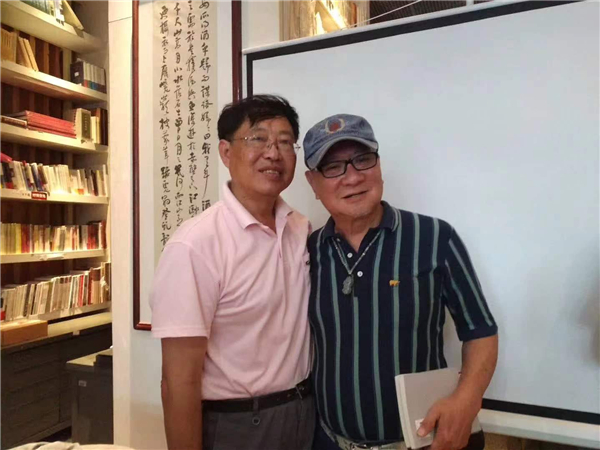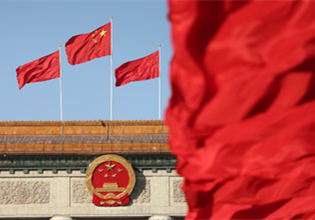Passion for Sino-Japanese exchanges memorialized in song

Kawakami Sadao (right) and Wuxi writer Zhang Songxuan at a book launch in Wuxi, Jiangsu province, in 2019. [Photo provided to China Daily]
Chinese composer Li Hong was amazed when she read the lyrics of a song written in Chinese by former Japanese businessman Kawakami Sadao.
The song, called Long Tune, pays tribute to the Mongolian Long Tune, also known as urtin duu, a historic form of Mongolian folk songs that date back to the seventh century.
"The writing was exquisite and it was solemn and magnificent," said Li, a native of North China's Inner Mongolia autonomous region. She composed music with rich Mongolian musical elements to pair with Kawakami's lyrics.
"A deep appreciation for the grassland folk art is universal. It is easy to be felt and not restricted to borders," she added.
Released online in early January, the song was completed by three artists of Li, Kawakami and Chinese singer Ao Du, a member of the Chinese Musicians Association. Developing their friendship through an online chat group for music lovers, the three artists created the piece and called it "a gift" to the 50th anniversary of the normalization of diplomatic relations between China and Japan.
"We often say that China and Japan are separated only by a narrow strip of water," said Kawakami. "The hard-won friendship should be cherished both on the government and in the folk arts level.”
Kawakami, 76, now living in Hiroshima of Japan, was first exposed to the Long Tune through Japanese TV, which often shows programs with Mongolian customs as his country hosts many Mongolian sumo wrestlers.
Songs written in this music form often convey the history, culture, aesthetics, ethics and philosophy of Mongolians in lyrics paired with music that can range from elegant and relaxed to grand and dramatic.
"I was fascinated the first time I heard the Long Tune songs," Kawakami said in fluent Mandarin. "They remind me of the famous Chinese poem – "Between the vast sky and the boundless earth, flocks and herds appear as grass bends to wind'."
Kawakami said that he was so intoxicated with the melody that lyrics lauding this Oral and Intangible Heritage of Humanity just gushed out of his mind on a sleepless night.
Kawakami is an old friend of China. In the 1980s, he worked in the Japan-China Friendship Association's branch in Hiroshima, where he helped arrange shows in Japan for an acrobatics troupe, as well as a song and dance troupe from Chongqing in Southwest China.
He organized painting and calligraphy exhibitions for Chongqing artists in Japan. Kawakami said that these activities were the prelude to the establishment of a sister city relationship between Hiroshima and Chongqing.
In 1988, Kawakami began doing management work for a Japanese company in China, where he lived for three decades until his retirement in 2019. The former businessman has witnessed China's changes over the past 30 years and holds a deep appreciation for Chinese history and culture.
In his retirement, Kawakami published a book of lyrics portraying the scenic spots, folk culture and heritage sites in the city of Wuxi in East China's Jiangsu province, where he lived for 23 years and called his second home.
"The lyrics are concise and easy to remember. In this way, I want to make some contributions to the friendly exchanges between the Chinese and Japanese people," he writes in the book's foreword.
Kawakami has collaborated with three Chinese composers, including Zhang Zhishen from Harbin of Northeast China's Heilongjiang province and Yang Hong from Wuxi, all of whom have written music for his lyrics for free.
"They (the Chinese artists) also have no regrets in promoting the China-Japan friendship," Kawakami said.
In his eyes, the city of Wuxi has been doing really well in promoting Sino-Japan friendship, regularly organizing painting exhibitions and cherry blossom festivals between the two countries.
Kawakami continues to be excited about promoting China and Japan's relationship through his lyrics. "Artistic communication has to be done by someone. As long as you do it, there may be results," he said, adding that he is planning to introduce some of his lyrics to local musical bands in Hiroshima with the hope that Japanese people can develop a better understanding of China through popular songs.
Xu Ruilan, former director of the culture and art club of the Wuxi Association of Foreign Invested Enterprises, said that Kawakami's writing shows how foreigners perceive and experience things in China that are familiar to locals from different perspectives and cultures.



 Print
Print Mail
Mail





